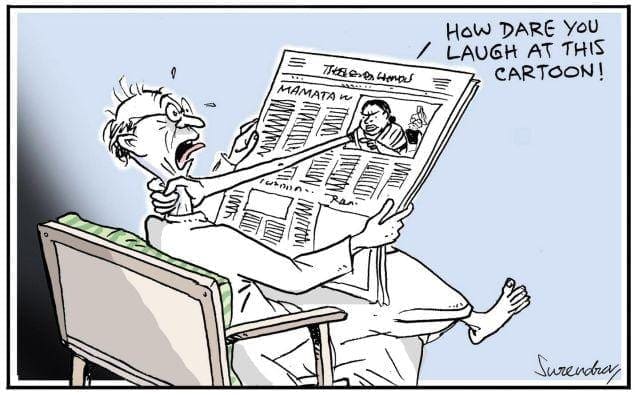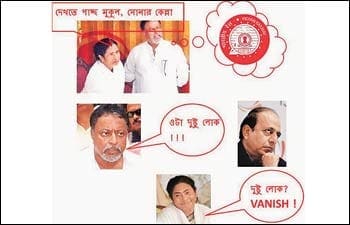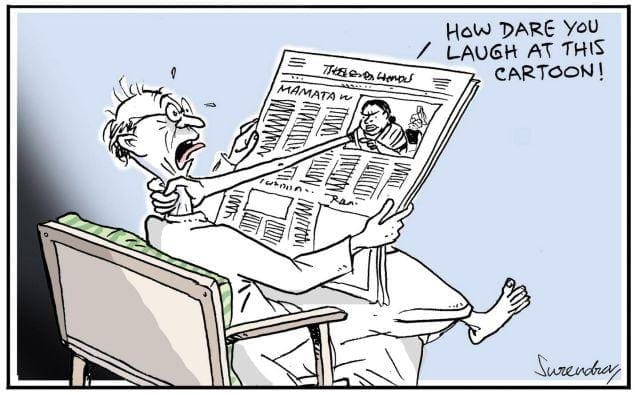
Ambikesh Mahapatra would never have imagined that circulating a caricature of the West Bengal chief minister, Mamata Banerjee on email would land him in jail. A professor of chemistry at the Jadavpur university Mahapatra and his seventy year old neighbour spent an entire night in jail. They were booked on charges of defamation, outraging the modesty of a woman and hacking. The caricature in question made a humorous reference to the replacement of Dinesh Trivedi with Mukul Roy as the Railway Minister by Mamata Banerjee.

Mahapatra’s incarceration comes in a series of ridiculous measures employed by the Trinamool administration to stifle free speech in West Bengal. Dozens of newspapers were blacklisted from the state public libraries while chapters on the philosophy of Karl Marx and Friedrich Engels were proposed to be removed from the higher secondary history textbooks of the state board. These ill-informed decisions betray the utter contempt for democratic principles that Banerjee possesses. It is in a way ironic because a woman who as the leader of opposition often found herself fighting the authoritarian nature of the communist government today has fallen into the same trap of hubris and megalomania that her predecessors were in.
In the epic Hindu text ‘Natya Shastra’ written by the sage Bharata, there is a beautiful story of how the gods defend free expression when it is threatened. After watching a play depicting the victory of Indra over the asuras, the demons are offended and try to attack the actors. Indra and Brahma stand up for the actors and place gods at the four corners of the stage to protect them. Indra declares that anything can be said on that stage without any obstruction. Sadly the respect our gods had for freedom of expression is not something that is common in our society today. Instead, free speech and expression have been held hostage to demagogy of the political establishment and threats from rowdy fundamentalists.
MF Husain, the world renowned master Indian painter was literally chased out of India when some of his paintings were deemed ‘offensive’ by Hindu fundamentalists. Though the call for for his arrest originating from the scores of cases filed against him filed under archaic laws was suspended by the Supreme Court, he refused to come back to India citing possible violence and intimidation. He died in self imposed exile at London in sadness and regret.
Salman Rushdie, the doyen of Indian literature in English has paid a heavy price for exercising his legitimate freedom of expression. Fatwas were declared by Isl?mic fanatics asking for his head, he lived for almost nine years under a persistent death threat. But perhaps he was let down the most by India, the country of his birth. At a time when the government should have stood up for him and his rights, India under Rajiv Gandhi became the first country to effectively ban his book, ‘The Satanic Verses’. While no Indian edition of The Satanic Verses exists till today, importing any foreign editions is banned. In an ugly display of political appeasement, no guarantees were provided by the Rajasthani authorities for his security following which he was forced to cancel his visit to the Jaipur literary festival earlier this year.
While Rushdie and Husain are famous examples, there have been many cases where artists and writers have been intimated and their works have been censored. Every now and then we hear cases of history essays being taken off syllabi, of homosexual artists being attacked or of film screenings being violently interrupted while the government sits on its hands doing nothing just because it is too scared to ‘hurt the sentiments’ of certain communities.

These recurrent attacks on freedom of expression are symbolic of the intolerance that has crept into our society. In most cases the pretext that is given to stifle freedom of expression is that a certain work of art, literature or cinema causes offence and hurts the sentiments of a particular section of society. There can be no more dangerous precedents than this. As a democratic society the very benchmark of our broad mindedness is how we tolerate that which is antithetical to our conventional beliefs. Celebrating the freedom of expression of someone whom we agree with is easy, but the challenge comes when we have to defend the freedoms of someone who toes the line of convention, one who says things which are not agreeable to the multitude. So far we have failed in this particular challenge.
When you tell a person not to say a particular thing, ultimately that person doesn’t even think about it. Thus, when you limit expression what you are ultimately doing is limiting thought and a society that loses the faculty of radical thought ultimately loses all possible means of advancement. We need to guard ourselves from that fate at all costs.
This is a guest post by Sai Krishna. He is pursuing MBBS at Kasturba Medical College (KMC), Manipal. Sai Krishna is a self-confessed Politics and Current Affairs junkie and wannabe writer.

I would disagree with you on one thing…imposing a ban on speech does not necessarily do the same on thoughts…but then again unexpressed thoughts are like a safe without a combination.The raw materials of social evolution are essentially always present,it is its execution that never sees the light of the day.Otherwise a really well written article…
well if u say a subject is taboo…what that essentially means is that you want to give it an aura of ‘undebatability’ for the want of a better word. when you tell people that a particular subject is undebatable, why would anyone toe the line even mentally? when you do not have the requisite philosophical raw material, how are you going to have execution?